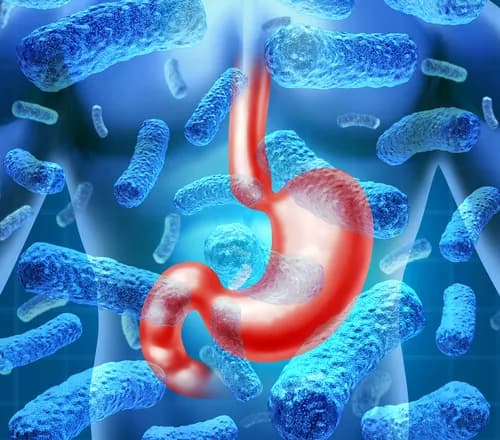
Research In Worms Provides A Model To Study How The Human Microbiome Influences Disease
The billions of microorganisms living within the human digestive tract appear to play a significant role in health and disease, notably metabolic syndrome, autoimmune disorders and diabetes -- but how these organisms do so is not well understood. Researchers at the Buck Institute have used worms to provide a framework for deciphering how specific bacterial signals from the microbiome influence the host, whether the host is a worm or a human.
The work, done in the nematode worm C. elegans and detailed in Scientific Reports, an online open access journal from the publishers of Nature, reveals for the first time how different genes in bacteria -- rather than metabolites produced by the bacteria -- modify the biology of the worms that eat them.
"The dynamic nature of the gut microbial community has proven hard to study in mice and even harder in human subjects," said Buck professor Pankaj Kapahi, PhD, senior scientist on the study. To start to untangle the complicated interactions, his team thought to use worms, which eat bacteria as part of their normal diet. "We have uncovered the effects of bacterial genetics on the physiology of a simple organism, which may serve as a model system to study the gut microbiome in mammals to identify novel therapeutics to treat diseases," he said.
"Humans have a gut full of bacteria that are 'talking' with intestinal cells and ultimately affect the whole organism, so there has been a lot of research targeting bacterial metabolites associated with human disease. This study is the first one to explore how the bacteria themselves talk to the host," said Amit Khanna, PhD, a postdoctoral research fellow in Kapahi's lab.
The foundations of this study began years ago not as a study of the microbiome, but as a contemplation of why worms that ate less lived longer. Kapahi wondered what in the worms' diet was responsible for this change in lifespan, and he thought the best way to answer that question would be to genetically mutate the bacteria they eat to see what caused any changes.
To have an easy yes-or-no answer as to whether different mutations in bacteria affected the worms, the team took advantage of a phenomenon in the worm's life cycle called dauer, in which larvae shut down their functions to survive harsh environmental conditions. It is known that one of the factors causing worms to enter dauer are compounds produced by the bacteria they eat and that one of the pathways that controls this response is the insulin-like signaling pathway.
Although humans and nematodes are of course quite different, Kapahi noted, many pathways are very similar, including insulin-like signaling, which plays a role in human diseases, such as type 2 diabetes and obesity.
To ask the question about what genes in bacteria normally present at low levels in human gut flora would affect the insulin-like signaling pathway in worms, the team first systematically screened nearly 4,000 stains of E. coli bacteria that each had a single gene deactivated ("knocked out") to see which enhanced dauer formation. They found 56 mutants that did so.
Some of these mutants also extended adult lifespan in control worms. The team picked one of the bacterial mutants that increased lifespan by the largest amount -- called adenylate cyclase (cyaA) -- to further explore. They found cyaA modulates dauer formation and lifespan by influencing TGF-β signaling, and they uncovered the entire molecular mechanism: they could see how the sensory neurons talk to the target cells and what were the molecular pathways involved that caused a worm to enter dauer.
"The idea that a single gene mutation -- in the bacteria that the worms normally eat -- could throw off an entire animal and send it into a dauer state was certainly not a concept that we anticipated when we began this study," said Kapahi.
The results demonstrate that the combination of bacterial and worm genetics can be a powerful tool to study the molecular signals by which bacteria modulate nutrient signaling and host physiological processes, such as development and aging. These processes are often very similar in higher organisms, so the significance of the study is not limited to C. elegans. Worms also allow questions to be answered rapidly, on the order of 10 to 15 days.
"There a lot of studies showing that the microbiome influences this and that, but we have very little understanding of the mechanisms and how to make sense of the mounds of data," said Khanna. "We think our method might be the way forward: to be able to ask specific questions about what do individual bacterial components contribute and how do they do it."
Materials provided by Buck Institute for Research on Aging. Note: Content may be edited for style and length.
Disclaimer: DoveMed is not responsible for the adapted accuracy of news releases posted to DoveMed by contributing universities and institutions.
Primary Resource:
Khanna, A., Kumar, J., Vargas, M. A., Barrett, L., Katewa, S., Li, P., ... & Brem, R. (2016). A genome-wide screen of bacterial mutants that enhance dauer formation in C. elegans. Scientific Reports, 6, 38764. DOI: 10.1038/srep38764
Related Articles
Test Your Knowledge
Asked by users
Related Centers
Related Specialties
Related Physicians
Related Procedures
Related Resources
Join DoveHubs
and connect with fellow professionals

0 Comments
Please log in to post a comment.